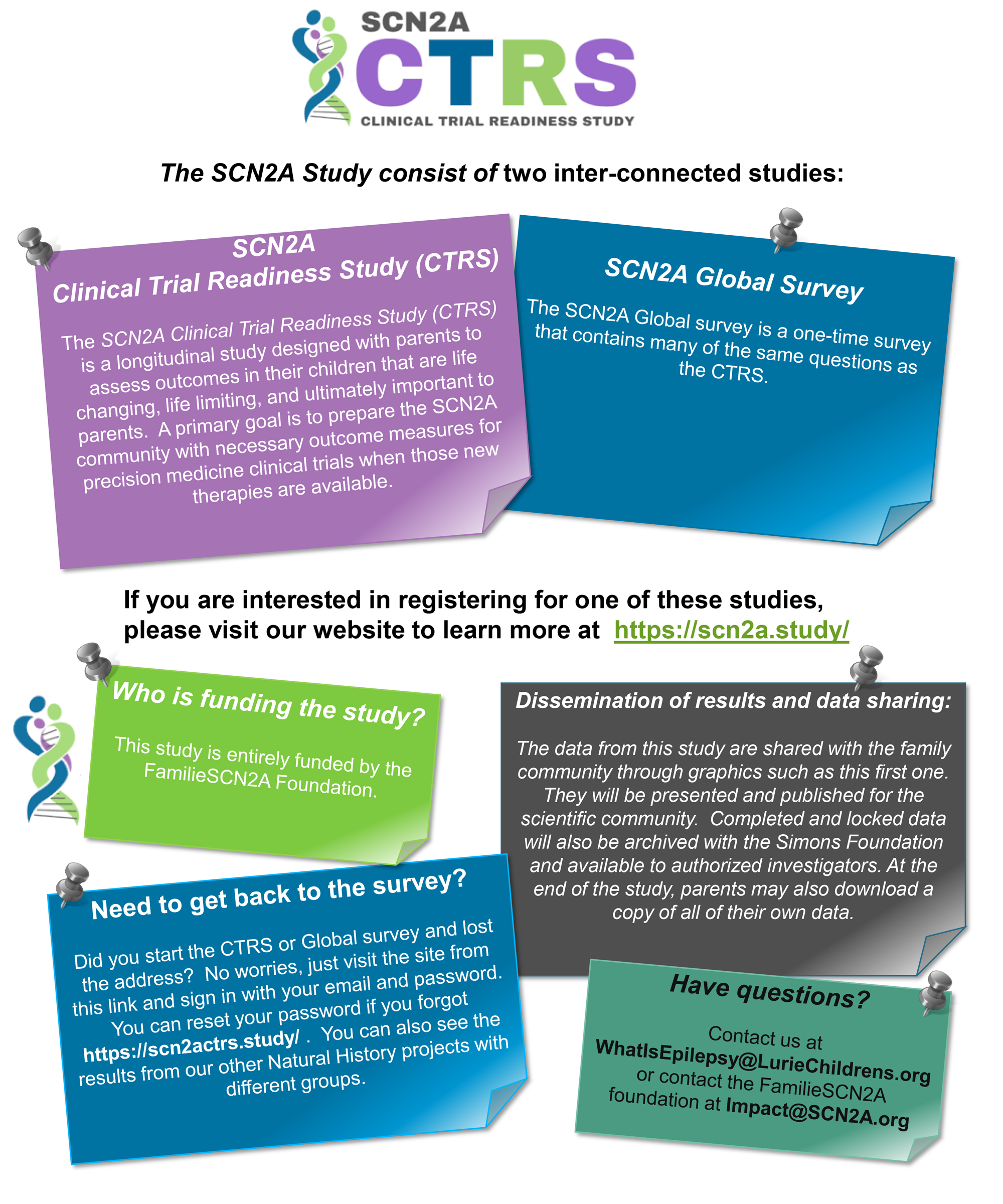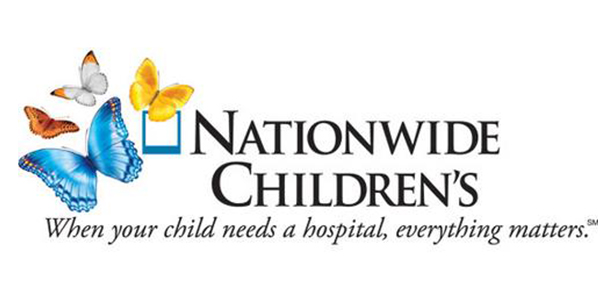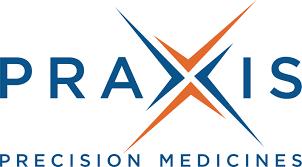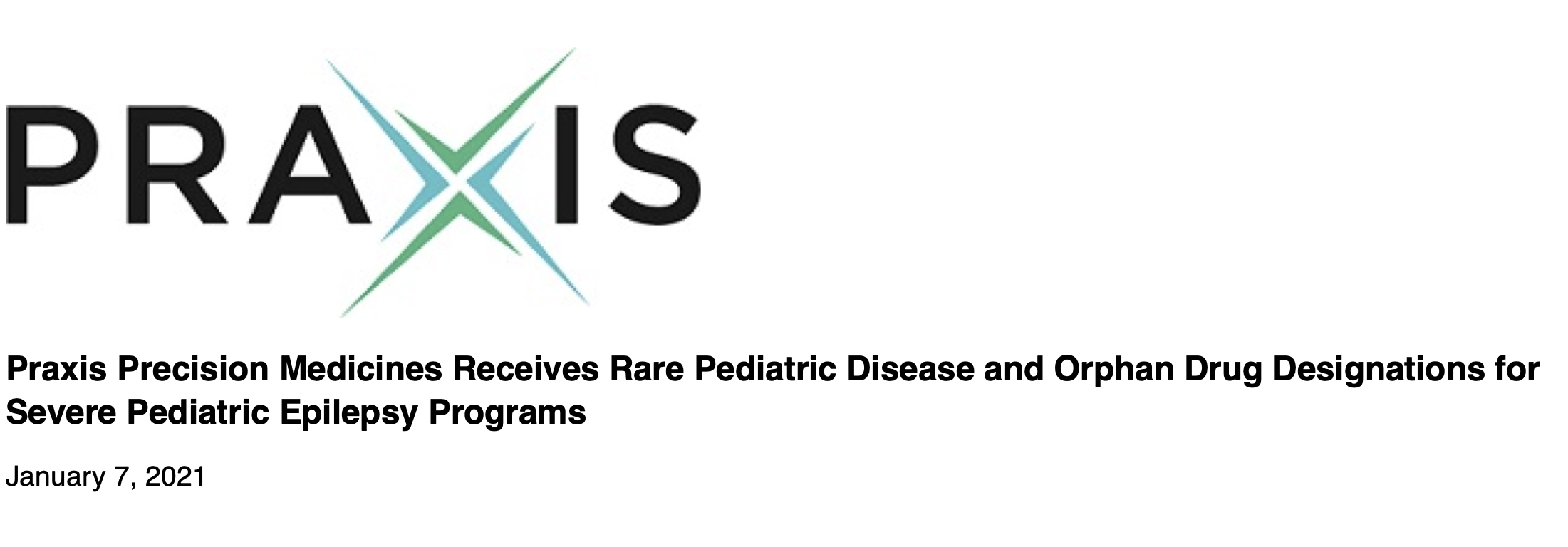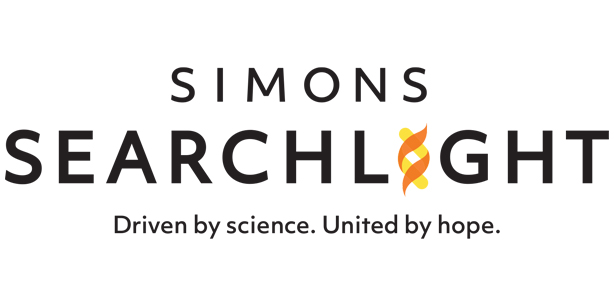The FamilieSCN2A Foundation believes that participation in research is our best hope! The following projects will bring us closer to understanding this complex sodium ion channel disorder and closer to improving treatments and finding cures. Participation is for anyone who has been diagnosed with a change in their SCN2A gene and is completely voluntary.
Clinical trials for new treatments and a cure are coming. Let's get READY!
WHY THE CTRS IS SO CRITICAL
Measuring the right outcomes in drug trials is the key to whether a drug is approved or rejected by the FDA. Most of you have an idea of how grueling and irrelevant many of these so-called measurements can be. Answering NO, my child can’t talk, NO, they can't walk, NO, they can't feed themselves over and over and over again can take a toll on us as caregivers and feels like a huge waste of our very limited time. These measurements, although the FDA and many Industry groups continue to use them, are likely NOT the best ones to show what our children CAN do. They are not sensitive enough to show the very small inch-stones our kids are capable of. So how will they be able to tell if the drug is working if they are using the wrong measurements? They can’t. The drug will fail in clinical trials and none of our children will get the chance to try it.We work closely with scientists and clinicians who share our mission of improving the lives of those living with SCN2A-related disorders, finding new treatments and ultimately a cure. These advisors have spent time with us creating a strategic plan to ensure that when new treatments are ready for the clinic, we have done all we can to ensure they are successful and make it to as many of our children as possible. This is why the CTRS is so critical.
The CTRS is evaluating several measures. Thanks to those who have participated, we have already learned a lot about which measurements work best in our population and even about how to best administer them. Now it is time to wrap up recruitment, encourage all of you who are enrolled to complete your surveys, and get this data out to those who need it. We need your help to do this.
We are making the jobs of the Industry groups easy by setting their trials up for success because we all have the same goal - a cure for our children.
Print CTRS Flyer
LEARN MORE
Be a SCN2A Voice
Interview with the SCN2A CTRS Primary Investigator:
Go to Interview
Recent publication in Epilepsia discussing need for better measurements for SCN2A:
View PDF
Video to better understand different types of data and the purpose of each
Watch Video
CURRENT RESEARCH
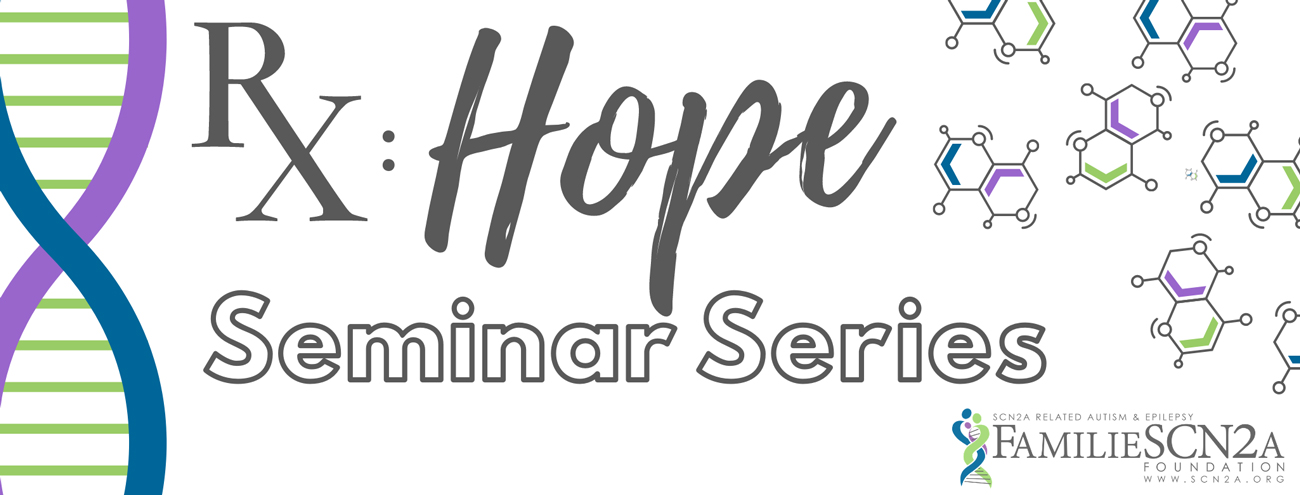
Families of SCN2A is proud to announce the support of a collaborative research project in Dr. Kathrin Meyer and Dr. Nicolas Wein laboratories at Nationwide Children’s Hospital, Columbus, Ohio, USA. Dr. Meyer’s laboratory concentrates on disease modeling of neurodegenerative and neurological diseases with a strong translational focus. Moroever, Dr. Meyer and Dr. Wein develop Gene Therapies for neurological and neuromuscular disorders using small RNA based approaches to increase full length protein expression or decrease production of toxic RNAs. Dr. Meyer and Wein are characterizing multiple SCN2A mutation carrying cell lines that have been collected from patients over the last year. They will develop a robust assay for drug screening and testing of new therapeutic strategies using these cells. They will also perform expanded compound testing and work on understanding underlying disease mechanisms in more detail. Finally, they will develop and test gene therapy approaches on the different patient cell lines.
UPDATE April 12, 2021
We are proud to give an important update on the work we are supporting with Dr. Kathrin Meyer and Dr. Nicolas Wein at Nationwide Children’s Hospital in Columbus, Ohio. The Foundation is sponsoring a safety study in juvenile, non-rodent, animals for the molecule CuATSM. CuATSM is currently in clinical trials for other neurodegenerative disorders with years of positive safety data in adults. This molecule has shown efficacy in in-vitro experiments using SCN2A patient cell lines as well as a severe gain-of-function SCN2A mouse model. Should the data from the juvenile safety study confirm this, we are hoping to rapidly advance the program towards clinical trials in SCN2A, maybe even this year!
Praxis Precision Medicines is a biotechnology company in Cambridge, Massachusetts, dedicated to developing new medicines for patients and families affected by brain disorders including: genetic epilepsies, psychiatric diseases, movement disorders, and pain syndromes.
PRAX-222 is an investigational antisense oligonucleotide therapeutic for children with gain of function mutations in the SCN2A gene that cause severe and persistent seizures starting within the first week or month of life. This program is being conducted in collaboration with Ionis Pharmaceuticals and RogCon, Inc. PRAX-222 is currently in the early stages of pre-clinical testing which, if positive, would allow for initiation of clinical trials in patients in the future.
Praxis Precision Medicines, Inc. (NASDAQ: PRAX), a clinical-stage biopharmaceutical company translating genetic insights into the development of therapies for central nervous system (CNS) disorders characterized by neuronal imbalance, today announced that the U.S. Food and Drug Administration (FDA) has granted both rare pediatric disease and orphan drug designations for PRAX-222 for the treatment of SCN2A developmental and epileptic encephalopathy (SCN2A-DEE).
Simons Searchlight is the central SCN2A registry for researchers around the globe use gather data.
Your family’s data is important and valuable to compile for researchers to help get us closer to effective treatments and a cure!
If you haven't registered yet, please do so now by signing up at: https://www.simonssearchlight.org/
If you have questions, you can reach a Simons Searchlight coordinator by emailing coordinator@simonssearchlight.org or phoning toll-free number, 855-329-5638, between 8 AM and 4 PM Eastern time to talk directly with a study coordinator.
SODIUM CHANNELOPATHY COALITION
In July 2018, Leah Schust Myers and Michelle Lewis attended the Sodium Channelopathy Coalition Meeting on behalf of the FamilieSCN2A Foundation Research Committee. This innovative workshop was held in conjunction with other sodium channel foundations (which include SCN1A and SCN8A). The meeting brought together 35 of the world's leading researchers to develop collaborative approaches. The end goal of this meeting was and still is to accelerate progress towards treatment of the devastating sodium channelopathies through prioritization of the most promising research. Click the button below for notes from that meeting.
CHRISTOPHER AHERN, PH.D. PROFESSOR OF MOLECULAR PHYSIOLOGY AND BIOPHYSICS, THE UNIVERSITY OF IOWA
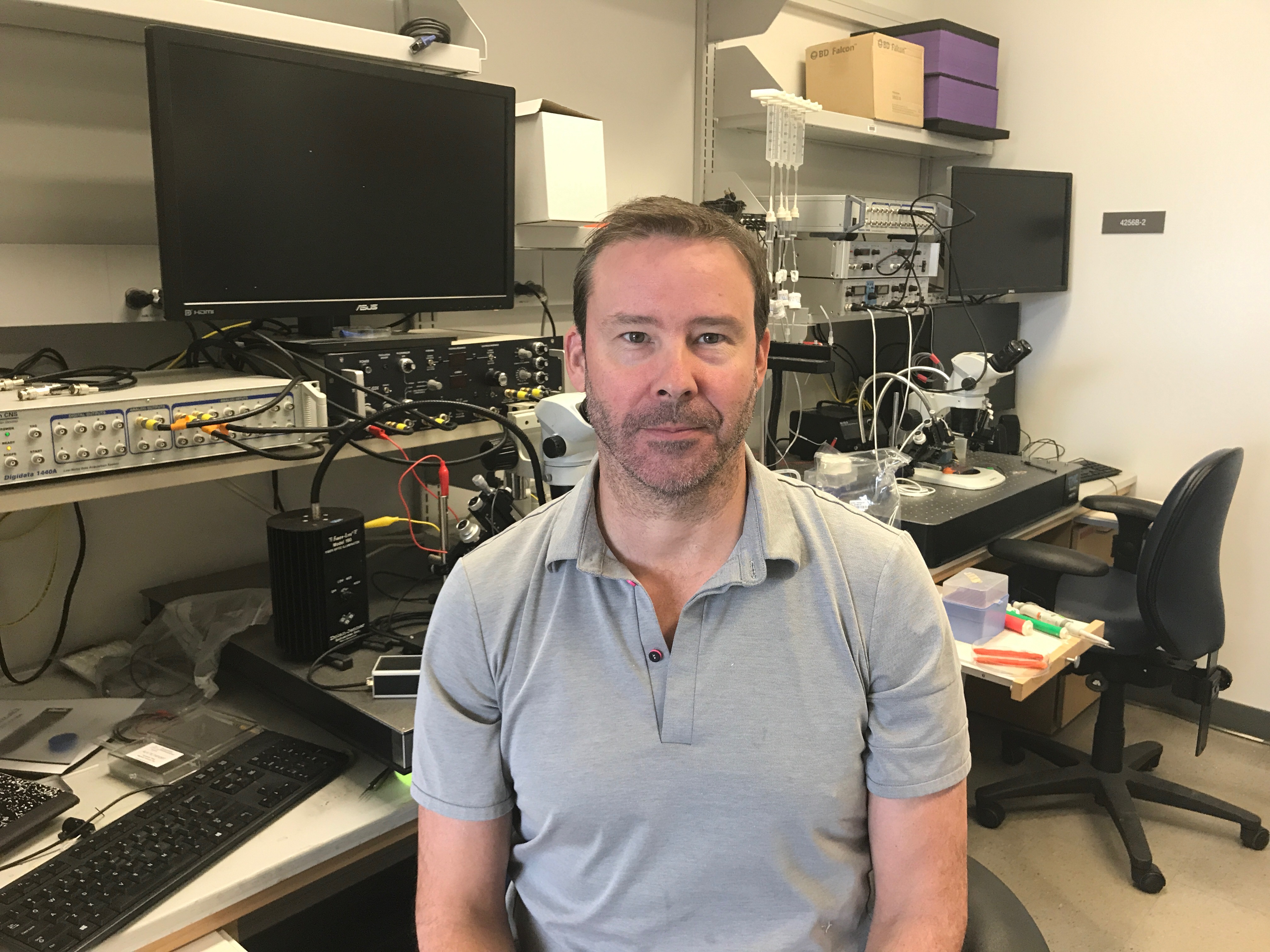
Gene therapy approaches for the conversion of premature termination codons (PTCs) in SCN2A are currently limited. Christopher Ahern and colleagues have developed a universal approach whereby engineered transfer RNAs (tRNAs) can be used to efficiently correct SCN2A PTCs in vitro and in vivo. Their current preclinical study will employ an adeno-associated virus to deliver these small RNA therapeutics to induced pluripotent stem cell-derived cortical cells from individuals who are known to have nonsense mutations in SCN2A to begin to overcome existing technical challenges for a one-time cure for SCN2A channelopathies that involve PTCs.
CAITLIN HUDAC, PHD THE UNIVERSITY OF ALABAMA
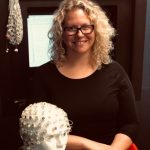
The Brain Research Across Development (B-RAD) Lab is directed by Dr. Caitlin Hudac, faculty in the Center for Youth Development and Intervention (CYDI) and Department of Psychology.
Understanding the social brain: Our research aims to understand how the brain changes as infants, children, and adults learn about the world. We primarily focus on the development of the social brain, including basic processes (e.g., social attention, intrinsic social motivation) and higher-ordered social cognition (e.g., understanding goal-oriented behavior, reasoning about others).
Healthy and atypical development: We work with healthy populations to better understand these mechanisms with an emphasis on how the social brain responds dynamically. In addition, we work to identify "biomarkers" that may be critical for generating targeted treatments for individuals with atypical development, such as autism spectrum disorder (ASD), intellectual disability (ID), or social anxiety disorder (SAD). We aim to identify unique subgroups by examining patterns across biomarkers -- for instance, subgroups based upon genetic etiology or based upon behavioral profile.
Addressing disparities: We investigate brain development in populations that are historically represented in research, including rural and minority (Black) populations. Several of our projects directly tackle this aim: for instance, we are part of a university-wide initiative designed to track longitudinal trajectories of rural children (including brain responses). More broadly, we are committed to overcoming traditional barriers to participation through community engagement together with our colleagues within CYDI, as well as creative solutions to reduce burden on families (e.g., researchers travel to complete EEG testing using portable equipment).
CENTER WITHOUT WALLS
Northwestern has been awarded a $12 million, five-year grant from the National Institutes of Health (NIH) to establish an interdisciplinary research center dedicated to advancing the genetic understanding of epilepsy.
The Channelopathy-Associated Epilepsy Research Center, led by Alfred George, Jr., MD, chair and Magerstadt Professor of Pharmacology, will focus on investigating sodium and potassium channel genes, the dominant class of genes responsible for early childhood-onset epilepsy. The center will be made up of a collaborative group of investigators at five academic medical centers, including Northwestern University, three free-standing research hospitals and two industry partners.
Press Release
GEOFFREY PITT, M.D., PH.D., WEILL CORNELL MEDICINE
Whole-exome sequencing studies of sporadic autism cases have identified SCN2A, which encodes the neuronal voltage-gated sodium channel NaV1.2, as one of the most commonly mutated genes associated with autism. How dysfunctional NaV1.2 affects neurons and consequent circuit function to produce behaviors associated with autism is not well understood.
Geoffrey Pitt and his colleagues at Duke University have recently characterized a familial autism mutation (R1902C) in SCN2A at the structural and biophysical level. This detailed understanding provides a platform upon which to generate a mouse knock-in model, offering a powerful tool for the research community to examine effects at any level — from the atomic (structural) level to behavioral phenotypes — of a monogenic autism mutation.
The researchers propose to generate a mouse bearing the R1902C knock-in mutation within SCN2A (using CRISPR/CAS9 technology) and to characterize the initial physiological and behavioral phenotypes. This mouse model, which will be shared with the research community after initial characterization, will then serve as a substrate for higher-level investigations into how a specific mutation in an autism susceptibility gene leads to the full spectrum of the disorder.
View PDF
UCSF

The Bender Lab
The Bender Lab is interested in understanding how loss of SCN2A affects nervous system function at the cellular, network, and behavioral level. Our recent focus has been to understand how SCN2A loss affects the function of neocortical networks in mouse models that either lack one Scn2a gene throughout life or are genetically engineered to delete one Scn2a gene in specific cell classes at specific developmental time points. We hope that these efforts will allow us to determine where and when future therapeutics will have the most benefit.
Sanders Lab
Post Doc, Dr Joon An is determining the nature and function of the SCN2A mutation in ASD; SCN2A is a gene that encodes a sodium channel that is critical for communication between brain cells, and has been shown to be important for both ASD and infantile seizures. This study will first use an animal model to examine how disruption of SCN2A function at different times in development affects other genes known to play a role in autism. Dr. An will also work with collaborators at UCSF to compare the behavioral and medical features of people with this mutation and autism compared to those without an autism diagnosis. This will help identify the more precise role of this mutation in autism. Eventually, this model could be used to test therapies that might improve symptoms in both people with the SCN2 mutation and those with other causes of ASD.
Nadav Ahituv, Ph.D.
Exome sequencing studies for autism spectrum disorder (ASD) have identified variants in SCN2A as being among the most common risk factors for ASD1. SCN2A encodes the alpha subunit of the voltage-gated sodium channel NaV1.2, which plays a role in neuronal excitability, particularly during early development. Using Scn2a heterozygous mice, the laboratory of Kevin Bender at the University of California, San Francisco have unpublished findings that suggest that Scn2a haploinsufficiency leads to deficits in neuronal excitability during early development, as well as deficits in synaptic function that persist into adulthood. The specific aims of this proposal are:
- Optimize adeno-associated virus (AAV) CRISPRa conditions in mice.In this proposal, Nadav Ahituv plans to use these mice as a tool to test a CRISPR activation (CRISPRa) therapeutic for this gene, upregulating the existing Scn2afunctional copy in these mice and analyzing the phenotypic consequences of this upregulation. Preliminary results from Ahituv’s laboratory suggest that CRISPRa can be used as a therapeutic tool to rescue deficits in Scn2a haploinsufficient mice in vivo.
Ahituv’s laboratory will generate AAV vectors that target Scn2a in mice and optimize the titers, single guide RNA (sgRNA) targets and injection conditions (both location and developmental age) to achieve activation levels in Scn2a heterozygous mice similar to that of wild-type mice.
- Assess the phenotypic consequences of Scn2a CRISPRa. Using the optimized CRISPRa conditions, Ahituv’s laboratory will rescue Scn2a levels in Scn2a heterozygous mice to wild-type levels and determine whether neuronal excitability and synaptic function is restored.
This work will provide insights into the possible therapeutic potential of CRISPRa gene therapy for the treatment of ASDs that are a result of SCN2A genetic mutations. In addition, this mouse model system will allow future testing, via targeted CRISPRa injections into Scn2a heterozygous mice, of the neural and temporal specificity through which SCN2A haploinsufficiency can lead to ASD.
BROAD

The Stanley Center is actively working on trying to develop compounds that can alter the function of Nav1.2 (SCN2A). The Therapeutics team is currently testing a large number of compounds using a novel technology they have co-developed with an external company to identify compounds that turn up or turn down the function of Nav1.2 to address the loss-of-function or gain-of-function patient populations respectively. The team has also recently characterized a loss-of-function SCN2A mouse model using EEG and are separately characterizing these mice looking at their behavior in collaboration with Harvard's Boston Children's Hospital. This past year Sumaiya Iqbal has created a program which automatically puts all known SCN2A variants onto its 3D structure. Recently Jen Pan and Dennis Lal have been awarded a grant with Al George and a number of other researchers where they will study a large number of SCN2A variants.
NEUROCRINE
*UPDATE December 2019*
Neurocrine Biosciences Gains Rights to XEN901, a Clinical Stage Selective Nav1.6 Sodium Channel Inhibitor, Being Developed for the Treatment of Epilepsy
Read More
Feedback from the FDA suggests that Neurocrine may be able to advance XEN901 directly into a Phase 2, or later stage, clinical trial examining efficacy in pediatric patients with SCN8A-EE, without requiring an adult clinical trial first. Neurocrine is currently in the process of completing a pediatric formulation of XEN901 and juvenile toxicology studies to support pediatric development activities. Neurocrine intends to run a Phase 1 pharmacokinetic (PK) study in adults with the new pediatric formulation beginning late in the third quarter of this year, and then initiate a Phase 2/3 clinical trial in SCN8A-EE patients. More details about the final trial design, anticipated timing, criteria, and endpoints will be disclosed over the coming months.
XEN901 Info:
Neurocrine is developing XEN901, a potent, highly selective Nav1.6 sodium channel inhibitor, for the treatment of epilepsy. A randomized, double-blind, placebo-controlled Phase 1 clinical trial to evaluate XEN901’s safety, tolerability and pharmacokinetics is ongoing. Thus far, safety, tolerability and PK for XEN901 are supportive of further development. Neurocrine expects to test XEN901 in both adult focal epilepsy as well as in SCN8A (Nav1.6) gain-of-function epilepsy (EIEE13), based on feedback from regulatory agencies. Neurocrine expects to submit a regulatory package to propose development of XEN901 in EIEE13 by the end of 2018.
Press ReleaseNav1.6/1.2 Dual Inhibitors:
Neurocrine is also developing additional compounds that are potent, selective blockers of both the Nav1.6 and Nav1.2 sodium channels, also for the treatment of epilepsy. These molecules are at the preclinical stages of development and if supported by the preclinical data, a Phase 1 clinical trial could be initiated in the next few years followed by efficacy studies potentially in SCN2A (Nav1.2) gain-of-function epilepsy (EIEE11) patients. Neurocrine will continue to provide updates as these molecules advance into and through clinical development.
The FamilieSCN2A Foundation will enter into corporate relationships for the sole purpose of providing mission related benefits to its members and the SCN2A community. We will not accept any corporate donation or enter into any corporate relationship that would create a conflict of interest, or even its appearance, with the Foundation’s mission, sound science, or board-approved policies. All procedures and formal agreements with corporate donors will be designed to prevent any undue influence upon The FamilieSCN2A Foundation. We will perform appropriate and adequate due diligence, with respect to all corporate donors, to ensure that the company’s activities, affiliations and business practices do not compromise our mission.
In all relations with external organizations, The FamilieSCN2A Foundation will act in ways that will only enhance our credibility and professional recognition. In order to ensure that all corporate donations are in alignment with The FamilieSCN2A Foundation’s mission and are always for the sole benefit of the SCN2A community, our Board of Directors has approved the following guidelines and principles regarding corporate support.
Types of Corporate Support
Financial and/or in-kind support in the form of grants and/or sponsorships for educational and communication vehicles (i.e., conferences, videos, podcasts, publications and community initiatives).
- Financial and/or in-kind support in the form of grants and/or sponsorships for fundraising purposes.
- Strategic alliances that provide improved services for constituents.
- Cause-related marketing.
- Health message promotion.
- Financial grants and/or professional support for clinical trials and research.
Vested Corporate Interactions to Avoid
A vested corporation is one that either makes or offers products/services used by an individual with SCN2A-related diseases.
- The FamilieSCN2A Foundation will not endorse any other corporation’s product, service or program.
- The FamilieSCN2A Foundation will not lend its name to license products, services or programs of other organizations.
- The FamilieSCN2A Foundation will not recognize or certify the quality or standards of a particular company, including its products and services.
- The FamilieSCN2A Foundation name and logo should not be associated with a specific branded product of an external company. References to the FamilieSCN2A website, phone number and address for the purposes of referral information are an exception to the above.
General Principles
The FamilieSCN2A Foundation will not endorse any corporation or product nor will it allow a corporation’s interest to factor into its decision-making process. All unrestricted educational grants received by FamilieSCN2A will acknowledge and recognize the contributing corporate donor, not the company’s product (i.e. specific drug.
- In exchange for contributions, FamilieSCN2A will allow standard recognition to include, but not be limited to, items such as signage and acknowledgement in Foundation publications. Additional types of recognition will be considered on a case-by-case basis, based on the type of funding or opportunity presented.
- The FamilieSCN2A Foundation will not accept grants that may adversely affect its nonprofit status.
- Revenue generated through corporations will be used to advance the mission of The FamilieSCN2A Foundation in accordance with the strategic plan.
- The FamilieSCN2A Foundation will maintain complete control of the development and implementation of all content and materials related to educational conferences and materials conducted by the Foundation.
- Corporations providing sponsorships for advocacy and research conferences or symposia will not influence conference content or selection of speakers.
- The FamilieSCN2A Foundation will maintain control and discretion over all corporate funds received and will ensure compliance with related grant agreements.
The FamilieSCN2A Foundation Policy on Organizational Participation in Food and Drug Administration Hearings and Meetings
The following information details The FamilieSCN2A Foundation’s official policy on organizational participation in Food and Drug Administration (FDA) hearings and meetings regarding the regulatory approval of drugs, biological products, and medical devices in accordance with its Corporate Relations Policy:
- The FamilieSCN2A Foundation will not generally provide testimony or submissions in its name in direct support for or against any drug, biological product, or medical device approval application. However, the Foundation may on occasion provide testimony, submissions, or participate in open or closed FDA meetings in its name to provide information about, or relevant to, SCN2A-related diseases, including information (e.g. evidence of community need, what constitutes evidence of clinical benefit, endpoints, etc.), which may be relevant to regulatory decisions regarding an application under FDA review or a product under development.
- Any request for The FamilieSCN2A Foundation to provide testimony, statements, or opinions either supporting or opposing specific drugs, biological products, or devices in FDA or regulatory approval proceedings shall be reviewed by the Scientific and Medical Advisory Board and our Board of Directors. These committees shall make a recommendation regarding whether The FamilieSCN2A Foundation should testify or take similar action. In the event that it is recommended that The FamilieSCN2A Foundation should provide testimony, statements, or opinions either supporting or opposing specific drugs, biological products, or devices in FDA or regulatory approval proceedings, final determination of the course of action to be taken by The FamilieSCN2A Foundation in an official capacity shall be made by the Board of Directors. If a representative of The FamilieSCN2A Foundation testifies before the FDA, that person will clearly disclose any conflict of interest prior to testimony or submission as is required at all FDA meetings and hearings. Nothing in this section prohibits the Executive Director or Research Coordinator from representing the interests of the FamilieSCN2A Foundation community in a manner that is non-specific to individual drugs, biological products, or medical devices.
- The FamilieSCN2A Foundation staff will monitor the development of drugs, biological products and devices relevant to SCN2A-related disorders, including the pendency of applications for FDA or other regulatory approval of such treatments, and provide this information to its members and the general public.
- In the dissemination of information concerning the development of treatments, officers and staff of The FamilieSCN2A Foundation will comply with the Corporate Relations Policy and refrain from taking any action that can be seen as endorsing any corporation’s product, service, or program, except as provided above.
- The Executive Director, together with the Board of Directors, will maintain complete control of the development and use of all content and materials produced or used by The FamilieSCN2A Foundation related to the dissemination of information concerning the development and regulatory approval of drugs, biological products, medical devices, or programs for the treatment of individuals with SCN2A-related disorders.
- Nothing in this policy impedes or discourages individual members of The FamilieSCN2A Foundation or its Scientific and Medical Advisory Board from participating in or testifying before the FDA or other regulatory panels, provided they make clear that they are not acting as a representative of The FamilieSCN2A Foundation.
The FamilieSCN2A Foundation Policy on timely requests
The FamilieSCN2A Foundation’s staff and Board of Directors value transparent and timely communication. The Executive Director, the Foundation’s sole employee, is the point of contact for Corporation engagement. We are happy to share information through our channels if given the opportunity to collaborate on the creation, review and edit.
- We are committed to responding to non urgent emails and phone calls within 48 hours
- Requests requiring Board of Directors approval will be reviewed on a bi-monthly basis
- Any requests requiring our Medical and Scientific Advisory Board review will be on a quarterly basis
- Become familiar with your child's genetic change. Learn the terminology (e.g. Missense, Nonsense, Mosaic, DeNovo, Gain of Function, Loss of Function). We can help with this, you can read the publications, speak with a genetic counselor, watch some of the webinars we have on the website, etc.
- Collect your child's medical records and have them organized, preferably scanned or electronic copies. If you have participated in Simons VIP, they can assist you with this process.
- Know your patient rights. If it is not clearly stated on the signed consent form, ask questions about confidentiality and how the data will be used. Will it be returned to you or to SCN2A's central database, Simons VIP? (Did you know that you can request a sample of any bio-specimens, including iPSCs (stem cells) be returned and housed with Simons VIP so other researchers can utilize them?)
- If you are contacted to participate in research and you are unsure about the ethics involved or have not heard about the study through the FamilieSCN2A Foundation, please contact us at Research@SCN2A.org. We can help you determine the legitimacy of the research as well as ensure that all avenues to collaboration are open for the best interest of the community. https://clinicalcenter.nih.gov/…/…/legal/bill_of_rights.html
